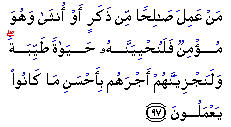Paradise on Earth, Saved by the Umbilical Cord, Quran & Hadith on Jews
Issue 267 » March 26, 2004 - Safar 5, 1425
General
| Living the Quran |
Al-Nahl
(The Bees)
In his commentary to this verse, ibn Katheer notes that this means that whoever performs the righteous deeds, which are acts of obedience in accord with the Quran and the Sunnah, will be given a good life in this world and in the Hereafter he will receive rewards according to the best of what he used to perform. He stated that "the good life" implies all forms of contentment and tranquility. Such has been reported from Ali, ibn Abbas, Ikrimah and Wahb ibn Munabbih. It is also recorded from ibn Abbas that it means happiness. Due to the misconception as to wherein lies the true happiness of this life that many are of the false impression that it is impossible to "enjoy" or be happy in both the life of this world as well as that of the Hereafter. In reality though, by concentrating one's intention on the Hereafter, the matters of this world become much "easier" and less tense. Allah thereby increases one's happiness in this world. The real rest and the real happiness can only come to those whom Allah blesses with such a blessing and which is received when one purifies one's soul and worships Allah alone with a true and complete form of worship. When a person accomplishes these matters, he becomes overcome with a joy that never leaves him and that is difficult to put into words. Ibn Taymiyyah attempted to express the joy that he felt from his faith in Allah and the deeds he performed. He once said, "In this world there is a Paradise that whoever does not enter it will not enter the Paradise in the Hereafter." He also said, "What can my enemies do to me? Certainly, my paradise and garden are in my chest." Source: |
| Understanding the Prophet's Life |
Saved by the Umbilical Cord In Ahmad, al-Tirmidhi, and Ibn Majah, the Prophet said, upon him peace: "Whoever sends forth three children that never reached puberty, they will be for him [and her] a strong fortress [in the hereafter]." Abu Dharr said, "I sent forth two." The Prophet said, upon him peace, "And two." Ubay ibn Ka`b said, "I sent forth one." The Prophet said, upon him peace, "And one; but that is only [subject to SABR] at the first shock." From Ibn Mas`ud. In the Musnad of `Abd ibn Humayd from Mu`adh, the Prophet said, upon him peace: "No two Muslims lost three children except Allah will cause the two parents to enter Paradise through the favor of His mercy toward them." They said, "What about two, Messenger of Allah?" He said, "Two also." They said, "And one?" He said, "[Even] the miscarried child will certainly drag its mother [and father, see below] with its umbilical cord to Paradise!" The Prophet said, upon him peace, "The miscarried child will pester its glorious and mighty Lord for His entering its two parents into the Fire until it is told, 'O miscarried child that pesters its Lord! Enter your father and mother into Paradise.' Then it will drag them with its umbilical cord until it makes them enter Paradise." Ibn Majah and Abu Ya`la from `Ali. "By the One in Whose hand is my soul, truly the miscarried child will certainly drag its mother with its umbilical cord to Paradise, provided one expects recompense [for SABR]." Ibn Majah and Ahmad from Mu`adh. "I swear that a miscarried child of mine I send forth before me is more beloved to me than [raising] a mounted knight that survives me." Ibn Majah from Abu Hurayra. Miscarriage is very devastating for a woman and should be treated with delicacy. It is best for us to give a shoulder to the sister, reassure her, educate her in what can cause miscarriage, and pray to Allah to give her strength. If you have gone through miscarriages and want to find out what went wrong, talk with your doctors and Insha Allah a cause can be found. And remember that Allah does not put a burden on a soul that it cannot bear. Pray to Allah for strength, and be patient. Source: |
| Cool Bits! |
Quran and Hadiths about Jews It is important to get a correct understanding of a number of verses of the Quran as well as sayings of the Prophet on Jews. Some Muslims take one verse or a few, without looking at when they were revealed or why, as well as the historical circumstances relating to them, as an excuse to mistreat Jews. This is not correct. Allah does criticize Jews in the Quran. He also criticizes Christians, polytheists, and Muslims. Our Creator has the perspective and the perfect knowledge which none of us can claim. The purpose of the God's criticism is to invite people to reaffirm their faith in the original teachings brought by the all Prophets and to correct the group's behavior or respond to a question they raised. Criticism of a people by their Creator though, is not a license to stereotype them, and certainly not an excuse to mistreat them individually or collectively with bad attitudes or behavior. Source: |
